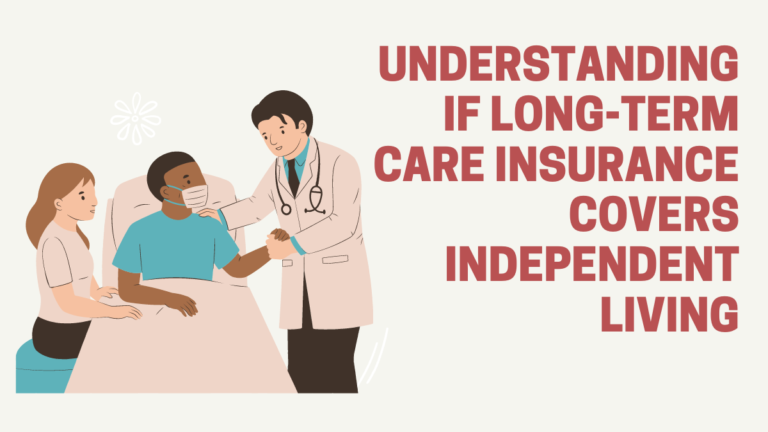5 Common Health Conditions that May Disqualify You from Long-Term Care Insurance

Long-term care insurance can be a valuable investment for those who want to ensure they are financially prepared for any health challenges in their future. However, not everyone may qualify for this type of coverage due to certain common health conditions that could increase the risk of needing long-term care services. In this blog post, we’ll take a closer look at five such conditions and what you need to know if you’re considering long-term care insurance. So let’s dive in!
Table of Contents
Introduction to Long-Term Care Insurance
Long-term care insurance is an insurance policy that helps pay for the costs of extended medical care. This type of care is usually needed when someone has a chronic illness or disability that prevents them from being able to care for themselves.
There are a few things to keep in mind before you purchase a long-term care insurance policy. One is that not all policies are created equal, so it’s important to compare different policies and find one that meets your specific needs.
It’s also important to know that some health conditions may disqualify you from being eligible for long-term care insurance. Here are some common health conditions that may result in ineligibility:
- Alzheimer’s Disease
- Dementia
- Stroke-Related Disability
- Parkinson’s Disease
Additionally, the cost of long-term care insurance can be a barrier for many people. Premiums may vary depending on personal factors and the type of policy purchased, so it’s important to shop around to find an affordable option.
Lastly, long-term care insurance is not a one size fits all solution. It’s important to take into consideration your health conditions, financial security, and goals when making this decision. A financial advisor or trusted family member may be able to help you make the best decision for your individual situation.
Common Health Conditions that Disqualify You
There are a number of common health conditions that may disqualify you from long-term care insurance. These include:
- Cancer
- Heart disease
- Stroke
- Alzheimer’s disease
- Parkinson’s disease
- Multiple sclerosis (MS)
- Chronic obstructive pulmonary disease (COPD)
- Chronic kidney disease
- Diabetes
- HIV/AIDS
Serious Mental Illness
A serious mental illness is defined as a mental, behavioral, or emotional disorder that results in functional impairment that substantially interferes with or limits one or more major life activities.
Some examples of disorders that would typically be considered a serious mental illness include: schizophrenia, schizoaffective disorder, bipolar disorder, major depressive disorder, and posttraumatic stress disorder.
In order to be diagnosed with a serious mental illness, an individual must exhibit symptoms for a significant portion of each day, for at least six months. These symptoms must also interfere with the individual’s ability to function in at least two major life domains (e.g., work, school, relationships).
Chronic Conditions
There are many chronic conditions that may prevent someone from qualifying for long-term care insurance. Some of the most common health conditions include: Alzheimer’s disease, cancer, stroke, heart disease, kidney disease, and diabetes.
These conditions can all have a major impact on a person’s ability to live independently and may require ongoing medical care and supervision. If you have any of these health conditions, it is important to speak with a long-term care insurance agent to see if you still qualify for coverage.
Another factor that can affect whether you are able to qualify for long-term care insurance is your age. Generally, the younger you are when applying for coverage, the better chance you have of being accepted. However, if you fall into a higher risk category due to one of these chronic conditions, some companies may require additional medical proof in order to approve the policy.
Substance Abuse
When you’re considering long-term care insurance, it’s important to be honest with yourself about your health and any potential risks. One of the questions you’ll be asked is whether you currently use tobacco products or have done so in the past. If you answered yes, you may still be able to qualify for long-term care insurance, but your rates will be higher.

Tobacco use is one of the biggest risk factors for developing chronic health conditions that could lead to a need for long-term care. These include heart disease, cancer, emphysema, and stroke. If you currently use tobacco products, or have done so in the past, your chances of developing one of these conditions are much higher than someone who has never used tobacco.
While you may still be able to qualify for long-term care insurance if you currently use tobacco products or have done so in the past, your rates will be much higher. This is because you’re considered a high-risk applicant. insurers typically charge smokers two to three times more for long-term care insurance than they do non-smokers.
If you’re not sure whether you currently use tobacco products or not, most insurers will consider any type of nicotine product as tobacco use. This includes cigarettes, cigars, pipes, chewing tobacco, snuff, and electronic cigarettes. Some insurers may also consider nicotine replacement products like patches or gum as tobacco use.
Cognitive Impairment
Cognitive impairment is one of the most common health conditions that may disqualify you from long-term care insurance. If you have cognitive impairment, you may have difficulty remembering things, making decisions, or communicating with others. You may also have problems with your vision or hearing.
Some cognitive impairments are temporary, such as those caused by stroke or head injury. Others, such as Alzheimer’s disease and dementia, are progressive and irreversible.
If you have cognitive impairment, you may not be able to make sound decisions about your health care and finances. As a result, you may need someone to help you manage your affairs.
In some cases, cognitive impairment can be managed with medication and/or therapy. However, if the impairment is severe, it may not be possible to live independently. If this is the case, long-term care insurance will likely not be an option.
Terminal Diseases
There are a number of terminal diseases that may prevent you from qualifying for long-term care insurance. These include cancer, heart disease, Alzheimer’s disease, and other degenerative diseases. If you have any of these conditions, it is important to speak with your doctor about your options and whether or not long-term care insurance is right for you.
It is important to note that long-term care insurance is not intended to provide treatment for terminal illnesses, and it cannot guarantee that all services will be covered if you are diagnosed with a terminal illness. In general, long-term care policies are designed to cover services related to helping you maintain or improve quality of life rather than providing treatment for the condition itself.
Alternative Solutions When Disqualified for Long-Term Care Insurance
If you’ve been denied long-term care insurance, it’s important to know that you have options. There are a number of alternative solutions that can provide you with the coverage you need.
One option is to purchase a standalone long-term care policy. These policies are not tied to your health insurance and can be used to cover the costs of long-term care services.
Another option is to purchase a life insurance policy with a long-term care rider. This type of policy will cover the costs of long-term care services if you become disabled or unable to care for yourself.
There are also a number of government programs that provide financial assistance for those who need help paying for long-term care services. Medicaid is one such program, and it provides coverage for a wide range of individuals with low incomes.
There are many private organizations that offer financial assistance to those who need help paying for long-term care services. These organizations typically have their own eligibility requirements, so be sure to research them before applying.
Conclusion
While there are a number of health conditions that could disqualify you from long-term care insurance, the above mentioned conditions were among the most common ones. Unfortunately, if you have any of these pre-existing conditions, then it is likely that you will not be able to take out this type of policy. However, by staying healthy and keeping your medical costs down with regular check ups and preventative measures like exercising regularly, getting enough sleep and eating a balanced diet, you may still be able to qualify in the future.






